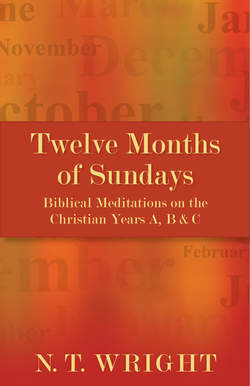Читать книгу Twelve Months of Sundays - N.T. Wright - Страница 46
На сайте Литреса книга снята с продажи.
ОглавлениеProper 5
Genesis 12.1–9
Romans 4.13–25
Matthew 9.9–13, 18–26
Abraham’s call (Abram, actually, at this stage; but just as we say the Archbishop was born in 1935, even though he wasn’t Archbishop then, so we don’t need to fuss about giving the patriarch the right name all the time). Abraham’s call to go out into the unknown is a fitting start for the long stretch of Sundays after Trinity. Equipped with the new vision of God in Jesus and the Spirit, we are to follow in obedience, knowing only who it is that leads us, and the purpose of the journey.
Abraham was promised the land; Abraham’s family was promised the earth. Or rather, the whole world was promised God’s blessing in and through Abraham’s family. That, after the curse of Genesis 3 and 11, was the point of Abraham’s call in the first place. God now makes a new start, absurd and scandalous as it seemed and still often seems, to create a new creation from within the old, a new human family from within the old, to give new life in the midst of death. Abraham, as far chronologically before Jesus as we are after him, was gripped by the strange presence of the one God doing a new thing. His descendants have been haunted by that presence, that purpose, ever since, especially when it turned into flesh and blood, into wind and fire.
But his descendants are no longer defined, as far as the New Testament is concerned, by flesh-and-blood generation. Romans 4, completing the argument which began in 3.21, explains God’s righteousness, God’s covenant faithfulness, in terms of God’s strange fulfilment of the promises to Abraham in Genesis 12—18, focusing especially on ch. 15. This fulfilment has happened in Jesus Christ, and in the creation through him of the worldwide family promised to Abraham in the beginning. The emphasis of the whole chapter is that Abraham is the father, not of one nation only (as though, as the Galatians thought, one now had to become a fully-fledged Jew in order to belong to God’s covenant family), but of the many nations spoken of in Genesis 17. Romans 4.17 is therefore not, as in some translations, an aside, to be placed in a bracket; it is the climax of the chapter. Through the sin-forgiving death of Jesus and his life-giving resurrection, the covenant God has created a new, single family of Jews and Gentiles together, whose sole badge of identity is their faith, specifically their faith in Jesus’ resurrection (4.24), which shows that they share the faith of Abraham himself (4.19–22).
As so often, the grandeur of the Old Testament, and the fine-tuned arguments of Paul, are distilled into the gospel’s small-scale but sharp-edged human drama. Life comes, in place of death, to a Galilean home (and one synagogue ruler at least, we may assume, followed Jesus ever after). Matthew, like Abraham, obeys the call to follow, he knows not where.
